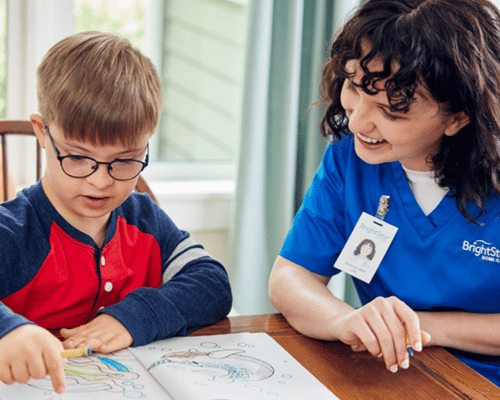As parents, caregivers, and guardians, our primary aim is to ensure our children grow up in a loving and nurturing environment. But what happens when a child requires more than just the usual care and attention due to special needs or chronic illnesses? This is where long-term care steps in, offering steady support and security. In this blog, we'll delve into the importance of providing consistent long-term care for children and how it makes a monumental difference in their lives.
Not every child grows up with the same needs. Some may have physical or intellectual disabilities, while others may suffer from chronic illnesses that require daily attention. Long-term care recognizes these unique requirements and ensures that children receive the support they need to thrive.
When we picture childhood, many of us imagine carefree days filled with play and exploration. However, this isn’t the reality for every child. Many children face unique challenges that require additional support. Let's delve deeper into understanding the vital need for long-term care for these special youngsters.
Physical disabilities, whether congenital or acquired, present a myriad of challenges for children. They often need assistance with daily tasks, such as dressing, eating, or moving around. But it's not just about mobility or daily functions. Long-term care addresses the complete physical well-being of the child. It ensures they have access to therapies, appropriate equipment, and interventions that promote their independence and improve their quality of life.
Children with intellectual disabilities might process information differently or face challenges in adaptive behaviors. While they possess a vast array of abilities and potential, they often require tailored educational approaches and social training. Long-term care provides these children with the specialized support they need, helping them tap into their strengths and navigate the world around them with confidence.

Dealing with a chronic illness can be draining, both physically and emotionally. For a child, managing a condition that demands daily attention, like diabetes or cystic fibrosis, can overshadow regular childhood experiences. Here, long-term care acts as a backbone. It ensures that children receive consistent medical care, emotional support, and education about their condition. This empowers them to take charge of their health and live fulfilling lives despite their chronic conditions.
Understanding the need for long-term care isn’t just about recognizing the specific challenges children face. It’s about appreciating the holistic nature of care these children require. Beyond medical interventions and therapies, these children need emotional support, social inclusion, and opportunities to learn and grow. Long-term care ensures they receive this well-rounded support, making certain that every child, irrespective of their challenges, gets a chance to shine and thrive.
Children flourish when their environment is stable and predictable. With long-term care, children understand that they have someone who will always be there for them. This consistency fosters trust, which is crucial for their emotional and psychological growth
Imagine a world where you never know what's coming next. It's unsettling, isn't it? For children, the uncertainty can be even more overwhelming. When children can predict what's next, whether it's a mealtime, a therapy session, or bedtime, they feel secure. This predictability, actively provided by long-term care, soothes anxieties and allows children to focus on learning, playing, and growing.
Trust doesn't develop overnight. It's a product of consistent actions and behaviors over time. When caregivers show up every day, attend to a child's needs, and offer unwavering support, they lay the bricks of trust. Children begin to believe in the reliability of their caregivers, understanding that they can depend on them no matter what. This trust, in turn, forms the bedrock of their emotional well-being.

Stability is more than just a comforting routine. It's an environment where emotions are validated, where there's room to make mistakes and learn from them. In a stable setting, children feel free to express their feelings, ask questions, and seek help. They develop resilience, learn empathy, and build self-esteem. With long-term care actively ensuring this stability, children receive the emotional and psychological tools they need to navigate life's ups and downs.
The world can often seem chaotic, filled with unexpected changes and challenges. For children requiring long-term care, this chaos can be amplified. A stable environment acts as their safe haven. It's the place where they know they're understood, where their needs are met, and where they can simply be children. By actively providing this haven, long-term care offers children a sanctuary where they can grow, dream, and aspire.
While the primary goal of long-term care is to address medical or developmental needs, it also plays a vital role in teaching children essential life skills. From personal hygiene to basic social interactions, long-term care providers guide children towards independence.
It's easy to focus solely on the immediate medical or developmental needs of a child, but life skills ensure they can navigate the broader spectrum of daily challenges. Whether it's tying shoelaces, brushing teeth, or making a simple decision, these skills empower children to interact with their environment confidently. Long-term care actively integrates these lessons into the care regimen, ensuring a holistic approach.
One of the first steps towards independence is mastering personal hygiene. By teaching children the importance of cleanliness, grooming, and basic self-care routines, we actively set the stage for a lifetime of healthy habits. This not only promotes physical well-being but also instills a sense of pride and accomplishment in the child.
The world is a complex web of interactions, and for a child, especially one with special needs, it can often seem daunting. By actively guiding children through basic social interactions, from making eye contact to expressing gratitude or sharing, long-term care providers lay the groundwork for successful social relationships. These skills not only help children bond with peers but also foster a sense of belonging.
Life is filled with choices, big and small. Long-term care doesn't just cater to immediate needs; it also equips children with the tools to make decisions and solve problems. Through guided activities and real-life scenarios, caregivers actively help children weigh options, consider consequences, and arrive at decisions. This nurtures their critical thinking abilities and paves the way for greater independence.

Long-term care doesn't just support children; it also empowers families. By offering respite and guidance, long-term care providers enable families to recharge and reconnect. They ensure parents and siblings have the resources and knowledge to care for their loved ones effectively.
While long-term care providers tend to a child's specific needs, they also actively wear a second hat—that of a mentor and guide for the family. By offering guidance on care techniques, resources, or simply being a sounding board, they fortify families with knowledge and confidence to navigate the challenges that come their way.
Caring for a child with special needs can be a 24/7 job, leaving families emotionally and physically drained. Respite care, an essential component of long-term care, offers families a break. Whether it's a few hours or a few days, this pause allows families to recharge, attend to personal needs, or simply take a moment to breathe. By actively providing this breather, long-term care ensures families return rejuvenated, ready to offer their best to their child.
The world of special needs is vast and, at times, bewildering. From therapies to support groups, there's a plethora of resources available. Long-term care providers actively guide families, connecting them with relevant resources, be it medical, educational, or financial. This not only alleviates the feeling of being overwhelmed but also ensures families can make informed decisions.
Isolation can be a grim side-effect for families with special needs children. Long-term care doesn't just offer medical support; it actively builds a community. Through group sessions, workshops, or informal gatherings, families meet others on similar journeys, forging bonds of understanding and support. This sense of community can be a beacon of hope, reminding families they're not alone.

BrightStar® Home Care, renowned in Edmond and Oklahoma City for exceptional senior care, also extends its expertise to cater to children’s needs. Our skilled team, comprised of fully screened, certified, and licensed caregivers, offers dedicated support to children who are ill or have disabilities, and also provides pediatric nursing. Beyond this, we actively assist parents with disabilities requiring that extra hand in child care.
Our wide-ranging services encompass pediatric companion care, personal care, skilled nursing, and various therapies—all available in the comfort of your home, whether on an ad hoc or long-term basis. Under the guidance of a Registered Nurse, our dedicated team offers specialized support for children with conditions like cerebral palsy or spina bifida, ensuring their daily needs are met. Additionally, our experienced pediatric nurses address a spectrum of health concerns, from chronic conditions to pediatric oncology. Choose BrightStar for holistic, compassionate child care.
1. Understanding the Need for Long-term Care
Not every child grows up with the same needs. Some may have physical or intellectual disabilities, while others may suffer from chronic illnesses that require daily attention. Long-term care recognizes these unique requirements and ensures that children receive the support they need to thrive.When we picture childhood, many of us imagine carefree days filled with play and exploration. However, this isn’t the reality for every child. Many children face unique challenges that require additional support. Let's delve deeper into understanding the vital need for long-term care for these special youngsters.
Physical Disabilities: Beyond the Obvious Challenges
Physical disabilities, whether congenital or acquired, present a myriad of challenges for children. They often need assistance with daily tasks, such as dressing, eating, or moving around. But it's not just about mobility or daily functions. Long-term care addresses the complete physical well-being of the child. It ensures they have access to therapies, appropriate equipment, and interventions that promote their independence and improve their quality of life.
Intellectual Disabilities: Nurturing Potential
Children with intellectual disabilities might process information differently or face challenges in adaptive behaviors. While they possess a vast array of abilities and potential, they often require tailored educational approaches and social training. Long-term care provides these children with the specialized support they need, helping them tap into their strengths and navigate the world around them with confidence.
Chronic Illnesses: A Day-to-day Battle
Dealing with a chronic illness can be draining, both physically and emotionally. For a child, managing a condition that demands daily attention, like diabetes or cystic fibrosis, can overshadow regular childhood experiences. Here, long-term care acts as a backbone. It ensures that children receive consistent medical care, emotional support, and education about their condition. This empowers them to take charge of their health and live fulfilling lives despite their chronic conditions.
The Holistic Approach of Long-term Care
Understanding the need for long-term care isn’t just about recognizing the specific challenges children face. It’s about appreciating the holistic nature of care these children require. Beyond medical interventions and therapies, these children need emotional support, social inclusion, and opportunities to learn and grow. Long-term care ensures they receive this well-rounded support, making certain that every child, irrespective of their challenges, gets a chance to shine and thrive.
2. Creating a Stable Environment
Children flourish when their environment is stable and predictable. With long-term care, children understand that they have someone who will always be there for them. This consistency fosters trust, which is crucial for their emotional and psychological growth
The Comfort of Predictability
Imagine a world where you never know what's coming next. It's unsettling, isn't it? For children, the uncertainty can be even more overwhelming. When children can predict what's next, whether it's a mealtime, a therapy session, or bedtime, they feel secure. This predictability, actively provided by long-term care, soothes anxieties and allows children to focus on learning, playing, and growing.
Consistency as the Pillar of Trust
Trust doesn't develop overnight. It's a product of consistent actions and behaviors over time. When caregivers show up every day, attend to a child's needs, and offer unwavering support, they lay the bricks of trust. Children begin to believe in the reliability of their caregivers, understanding that they can depend on them no matter what. This trust, in turn, forms the bedrock of their emotional well-being.
Emotional and Psychological Growth in a Stable Setting
Stability is more than just a comforting routine. It's an environment where emotions are validated, where there's room to make mistakes and learn from them. In a stable setting, children feel free to express their feelings, ask questions, and seek help. They develop resilience, learn empathy, and build self-esteem. With long-term care actively ensuring this stability, children receive the emotional and psychological tools they need to navigate life's ups and downs.
A Haven in a Chaotic World
The world can often seem chaotic, filled with unexpected changes and challenges. For children requiring long-term care, this chaos can be amplified. A stable environment acts as their safe haven. It's the place where they know they're understood, where their needs are met, and where they can simply be children. By actively providing this haven, long-term care offers children a sanctuary where they can grow, dream, and aspire.
3. Building Life Skills
While the primary goal of long-term care is to address medical or developmental needs, it also plays a vital role in teaching children essential life skills. From personal hygiene to basic social interactions, long-term care providers guide children towards independence.
Beyond Medical Interventions: The Broader Picture
It's easy to focus solely on the immediate medical or developmental needs of a child, but life skills ensure they can navigate the broader spectrum of daily challenges. Whether it's tying shoelaces, brushing teeth, or making a simple decision, these skills empower children to interact with their environment confidently. Long-term care actively integrates these lessons into the care regimen, ensuring a holistic approach.
Personal Hygiene: The Foundation of Self-care
One of the first steps towards independence is mastering personal hygiene. By teaching children the importance of cleanliness, grooming, and basic self-care routines, we actively set the stage for a lifetime of healthy habits. This not only promotes physical well-being but also instills a sense of pride and accomplishment in the child.
Social Interactions: Navigating the Social Labyrinth
The world is a complex web of interactions, and for a child, especially one with special needs, it can often seem daunting. By actively guiding children through basic social interactions, from making eye contact to expressing gratitude or sharing, long-term care providers lay the groundwork for successful social relationships. These skills not only help children bond with peers but also foster a sense of belonging.
Decision-making and Problem-solving: Steps Towards Independence
Life is filled with choices, big and small. Long-term care doesn't just cater to immediate needs; it also equips children with the tools to make decisions and solve problems. Through guided activities and real-life scenarios, caregivers actively help children weigh options, consider consequences, and arrive at decisions. This nurtures their critical thinking abilities and paves the way for greater independence.
5. Empowering Families
Long-term care doesn't just support children; it also empowers families. By offering respite and guidance, long-term care providers enable families to recharge and reconnect. They ensure parents and siblings have the resources and knowledge to care for their loved ones effectively.
The Dual Role of Long-term Care
While long-term care providers tend to a child's specific needs, they also actively wear a second hat—that of a mentor and guide for the family. By offering guidance on care techniques, resources, or simply being a sounding board, they fortify families with knowledge and confidence to navigate the challenges that come their way.
Respite: The Breath of Fresh Air
Caring for a child with special needs can be a 24/7 job, leaving families emotionally and physically drained. Respite care, an essential component of long-term care, offers families a break. Whether it's a few hours or a few days, this pause allows families to recharge, attend to personal needs, or simply take a moment to breathe. By actively providing this breather, long-term care ensures families return rejuvenated, ready to offer their best to their child.
Resource Connection: Bridging Gaps
The world of special needs is vast and, at times, bewildering. From therapies to support groups, there's a plethora of resources available. Long-term care providers actively guide families, connecting them with relevant resources, be it medical, educational, or financial. This not only alleviates the feeling of being overwhelmed but also ensures families can make informed decisions.
Building a Supportive Community
Isolation can be a grim side-effect for families with special needs children. Long-term care doesn't just offer medical support; it actively builds a community. Through group sessions, workshops, or informal gatherings, families meet others on similar journeys, forging bonds of understanding and support. This sense of community can be a beacon of hope, reminding families they're not alone.
BrightStar® Home Care in Edmond / Oklahoma City: Comprehensive Child Care Solutions
BrightStar® Home Care, renowned in Edmond and Oklahoma City for exceptional senior care, also extends its expertise to cater to children’s needs. Our skilled team, comprised of fully screened, certified, and licensed caregivers, offers dedicated support to children who are ill or have disabilities, and also provides pediatric nursing. Beyond this, we actively assist parents with disabilities requiring that extra hand in child care.Our wide-ranging services encompass pediatric companion care, personal care, skilled nursing, and various therapies—all available in the comfort of your home, whether on an ad hoc or long-term basis. Under the guidance of a Registered Nurse, our dedicated team offers specialized support for children with conditions like cerebral palsy or spina bifida, ensuring their daily needs are met. Additionally, our experienced pediatric nurses address a spectrum of health concerns, from chronic conditions to pediatric oncology. Choose BrightStar for holistic, compassionate child care.

